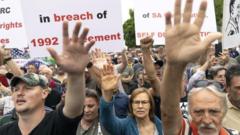A South African court has rejected claims of white genocide in South Africa, describing such allegations as fanciful and unfounded, amidst international discourse fueled by notable US figures.
South African Court Dismisses White Genocide Claims as Fabricated

South African Court Dismisses White Genocide Claims as Fabricated
Court ruling challenges narratives pushed by US figures, affirming non-existence of racial extermination.
In a significant ruling, the South African court has dismissed the notion of a white genocide as a "clearly imagined" concept, declaring it "not real." This ruling comes against a backdrop of heightened scrutiny regarding the treatment of the country's white minority population, fueled by statements from figures such as former US President Donald Trump and entrepreneur Elon Musk. The decision specifically arose from a case involving a bequest of $2.1 million from Grantland Michael Bray to the white supremacist group, Boerelegioen. The court invalidated this donation, arguing that it was vague and contrary to public policy.
Over the years, Trump has amplified claims of widespread violence against white farmers in South Africa, suggesting that tensions necessitate refugee status for these individuals in the US. Musk has similarly voiced claims about "racist ownership laws" and previously highlighted supposed threats against white populations in South Africa. The court action, however, was brought by Bray's siblings, who expressed concern over their brother's fixation on the concept of impending genocide that had consumed him later in life.
Judge Rosheni Allie noted that Bray, paralyzed from a military accident, had developed paranoia that was exacerbated by his racist beliefs and exposure to extremist online content. Bray's involvement with the Boerelegioen began in 2020, during which he contributed substantial funds for its activities. However, the ruling centralized on the ambiguity surrounding which entity of the Boerelegioen was intended to benefit from his will.
The court firmly ruled that the claims of genocide were nonsensical, emphasizing that resources allocated by Bray could potentially support dangerous ideologies of racial hatred. Contrarily, the Boerelegioen claimed to provide security and training for communities, devoid of racial discrimination. Ultimately, the court ruled in favor of Bray's siblings and mandated that the Boerelegioen cover the court costs.
In parallel political actions, earlier in September, Trump signed an executive order that halted US financial aid to South Africa over a contentious land seizure law. This law allows for certain government-led land seizures, which has become a focal point of far-right discussions surrounding the treatment of white farmers in South Africa. Despite numerous assertions about systematic attacks on the white Afrikaner population, local crime statistics tell a different tale; out of thousands of murders recorded, very few were linked to farm attacks, challenging the narrative of widespread persecution.
Over the years, Trump has amplified claims of widespread violence against white farmers in South Africa, suggesting that tensions necessitate refugee status for these individuals in the US. Musk has similarly voiced claims about "racist ownership laws" and previously highlighted supposed threats against white populations in South Africa. The court action, however, was brought by Bray's siblings, who expressed concern over their brother's fixation on the concept of impending genocide that had consumed him later in life.
Judge Rosheni Allie noted that Bray, paralyzed from a military accident, had developed paranoia that was exacerbated by his racist beliefs and exposure to extremist online content. Bray's involvement with the Boerelegioen began in 2020, during which he contributed substantial funds for its activities. However, the ruling centralized on the ambiguity surrounding which entity of the Boerelegioen was intended to benefit from his will.
The court firmly ruled that the claims of genocide were nonsensical, emphasizing that resources allocated by Bray could potentially support dangerous ideologies of racial hatred. Contrarily, the Boerelegioen claimed to provide security and training for communities, devoid of racial discrimination. Ultimately, the court ruled in favor of Bray's siblings and mandated that the Boerelegioen cover the court costs.
In parallel political actions, earlier in September, Trump signed an executive order that halted US financial aid to South Africa over a contentious land seizure law. This law allows for certain government-led land seizures, which has become a focal point of far-right discussions surrounding the treatment of white farmers in South Africa. Despite numerous assertions about systematic attacks on the white Afrikaner population, local crime statistics tell a different tale; out of thousands of murders recorded, very few were linked to farm attacks, challenging the narrative of widespread persecution.





















